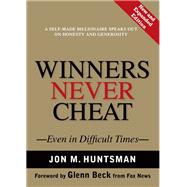
What is included with this book?
Jon M. Huntsman is chairman and founder of Huntsman Corporation. He started the firm with his brother, Blaine, in 1970. By 2000, it had become the world's largest privately held chemical company and America's biggest family-owned and operated business, with more than $12 billion in annual revenues. He took the business public in early 2005. He was a special assistant to the president in the Nixon White House, was the first American to own controlling interest of a business in the former Soviet Union, and is the chairman of the Board of Overseers for Wharton School at the University of Pennsylvania, his alma mater. Mr. Huntsman also has served on the boards of numerous major public corporations and philanthropic organizations, including the U.S. Chamber of Commerce and the American Red Cross. The Business School at Utah State University is named after him, as is the basketball arena at the University of Utah. The Huntsman businesses fund the foundation that is the primary underwriter for the prestigious Huntsman Cancer Institute in Salt Lake City, which he founded. The hospital/research facility has become a leader in the prevention, early diagnosis, genetic legacies, and humane treatment of cancer. He resides with his wife, Karen, in Salt Lake City.
| Foreword | p. xvii |
| Introduction | |
| Good Times, Bad Times | p. 1 |
| Circumstances may change but your values shouldn't | |
| Lessons from the Sandbox | p. 11 |
| Everything we need for today's marketplace we learned as kids. | |
| Check Your Moral Compass | p. 25 |
| We know darn well what is right and wrong. | |
| Play by the Rules | p. 39 |
| Compete fiercely and fairly--but no cutting in line. | |
| Setting the Example | p. 53 |
| Risk, responsibility, reliability--the three Rs of leadership. | |
| Keep Your Word | p. 77 |
| It's high time to corral the corporate lawyers. | |
| Why We Cross the Line | p. 95 |
| There are many temptations, but reminders help. | |
| Pick Advisors Wisely | p. 107 |
| Surround yourself with associates who have the courage to say no. | |
| Get Mad, Not Even | p. 125 |
| Revenge is unhealthy and unproductive. Learn to move on. | |
| Graciousness Is Next to Godliness | p. 139 |
| Treat competitors, colleagues, employees, and customers with respect. | |
| Your Name Is on the Door | p. 157 |
| Table of Contents provided by Publisher. All Rights Reserved. |
The New copy of this book will include any supplemental materials advertised. Please check the title of the book to determine if it should include any access cards, study guides, lab manuals, CDs, etc.
The Used, Rental and eBook copies of this book are not guaranteed to include any supplemental materials. Typically, only the book itself is included. This is true even if the title states it includes any access cards, study guides, lab manuals, CDs, etc.